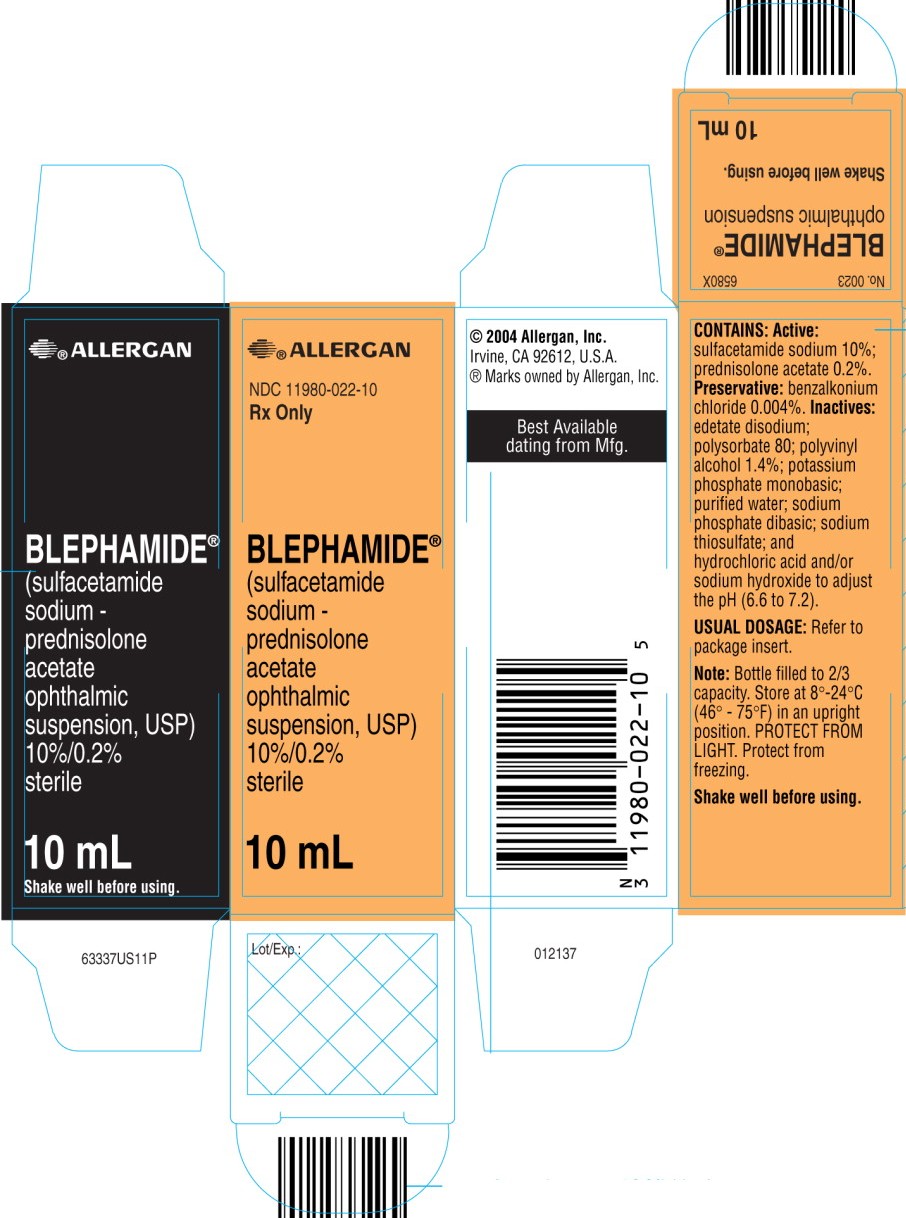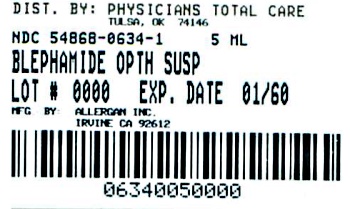Blephamide | Sulfacetamide Sodium And Prednisolone Acetate Suspension/ Drops while Breastfeeding

What is Blephamide | Sulfacetamide Sodium And Prednisolone Acetate Suspension/ Drops ?
Is using Blephamide | Sulfacetamide Sodium And Prednisolone Acetate Suspension/ Drops safe or dangerous while breastfeeding?

Nursing Mothers: It is not known whether topical administration of corticosteroids could result in sufficient systemic absorption to produce detectable quantities in human milk. Systemically administered corticosteroids appear in human milk and could suppress growth, interfere with endogenous corticosteroid production, or cause other untoward effects. Systemically administered sulfonamides are capable of producing kernicterus in infants of lactating women. Because of the potential for serious adverse reactions in nursing infants from sulfacetamide sodium and prednisolone acetate ophthalmic suspensions, a decision should be made whether to discontinue nursing or to discontinue the medication.
Blephamide | Sulfacetamide Sodium And Prednisolone Acetate Suspension/ Drops Breastfeeding Analsys
Sulfacetamide sodium while Breastfeeding
SafeCAS Number: 144-80-9
A short-term action Sulfonamide which is similar to Sulfathiazole (see specific info) that is locally used on vagina, eyes and skin. At latest update relevant published data were not found on excretion into breast milk. Because of the small dose used and poor absorption into plasma of most topical preparations for dermatological and ophthalmological issues, it is unlikely a significant excretion into breast milk. As with other sulfonamides, caution is recommended when using it on preterm infants and newborns with hyperbilirubinemia. Avoid it on patients affected with deficit of Glucose 6-Phosphate Dehydrogenase (6-GPD). Monitor the appearance of jaundice in the infant.
Prednisolone acetate while Breastfeeding
SafeCAS Number: 50-24-8

Excreted into breast milk in non-significant amount with no problems reported in breastfed infants whose mothers were treated at a daily dose as high as 7.5 mg for a long time period. At a daily dose of 60 mg used for treatment of Herpes or Gestational Pemphigus no harm effects on breastfed infants have been reported. On long term treatments it would be advisable to wait for 3 - 4 hours until the next nurse to minimize the transfer of drug to breast milk. At high doses, intra-articular treatment with other steroid drugs (Triamcinolone) have transiently affected milk production. Steroids administered before delivery may delay initiation of phase II of Lactogenesis ("milk come in") and decrease milk production in the first postpartum week. Decreased production has been seen while taking Dexametasone. Steroid drugs are commonly used for Pediatric treatment with no side effects when infrequently used and for short-time periods. The American Academy of Pediatrics rates it compatible with breastfeeding. WHO Model List of Essential Medicines (2002) rates it compatible with breastfeeding
Blephamide | Sulfacetamide Sodium And Prednisolone Acetate Suspension/ Drops Breastfeeding Analsys - 2
Prednisolone acetate while Breastfeeding
CAS Number: 50-24-8
Amounts of prednisolone in breastmilk are very low. No adverse effect have been reported in breastfed infants with maternal use of any corticosteroid during breastfeeding. With high maternal doses, avoiding breastfeeding for 4 hours after a dose should markedly decrease the dose received by the infant. However, this maneuver is not necessary with short-term use. High doses might occasionally cause temporary loss of milk supply. Because absorption from the eye is limited, ophthalmic prednisolone would not be expected to cause any adverse effects in breastfed infants. To substantially diminish the amount of drug that reaches the breastmilk after using eye drops, place pressure over the tear duct by the corner of the eye for 1 minute or more, then remove the excess solution with an absorbent tissue.
What if I already have used Blephamide | Sulfacetamide Sodium And Prednisolone Acetate Suspension/ Drops?
As usage of Blephamide | Sulfacetamide Sodium And Prednisolone Acetate Suspension/ Drops is mostly safe while breastfeeding hence there should not be any concern. In case of any change in behavior or health of your baby you should inform your health care provider about usage of Blephamide | Sulfacetamide Sodium And Prednisolone Acetate Suspension/ Drops else no further action is required.
My doctor has prescribed me Blephamide | Sulfacetamide Sodium And Prednisolone Acetate Suspension/ Drops, what should I do?
Usage of Blephamide | Sulfacetamide Sodium And Prednisolone Acetate Suspension/ Drops is safe for nursing mothers and baby, No worries.
If I am using Blephamide | Sulfacetamide Sodium And Prednisolone Acetate Suspension/ Drops, will my baby need extra monitoring?
No
Who can I talk to if I have questions about usage of Blephamide | Sulfacetamide Sodium And Prednisolone Acetate Suspension/ Drops in breastfeeding?
US
National Womens Health and Breastfeeding Helpline: 800-994-9662 (TDD 888-220-5446) 9 a.m. and 6 p.m. ET, Monday through Friday
UK
National Breastfeeding Helpline: 0300-100-0212 9.30am to 9.30pm, daily
Association of Breastfeeding Mothers: 0300-330-5453
La Leche League: 0345-120-2918
The Breastfeeding Network supporter line in Bengali and Sylheti: 0300-456-2421
National Childbirth Trust (NCT): 0300-330-0700
Australia
National Breastfeeding Helpline: 1800-686-268 24 hours a day, 7 days a week
Canada
Telehealth Ontario for breastfeeding: 1-866-797-0000 24 hours a day, 7 days a week
